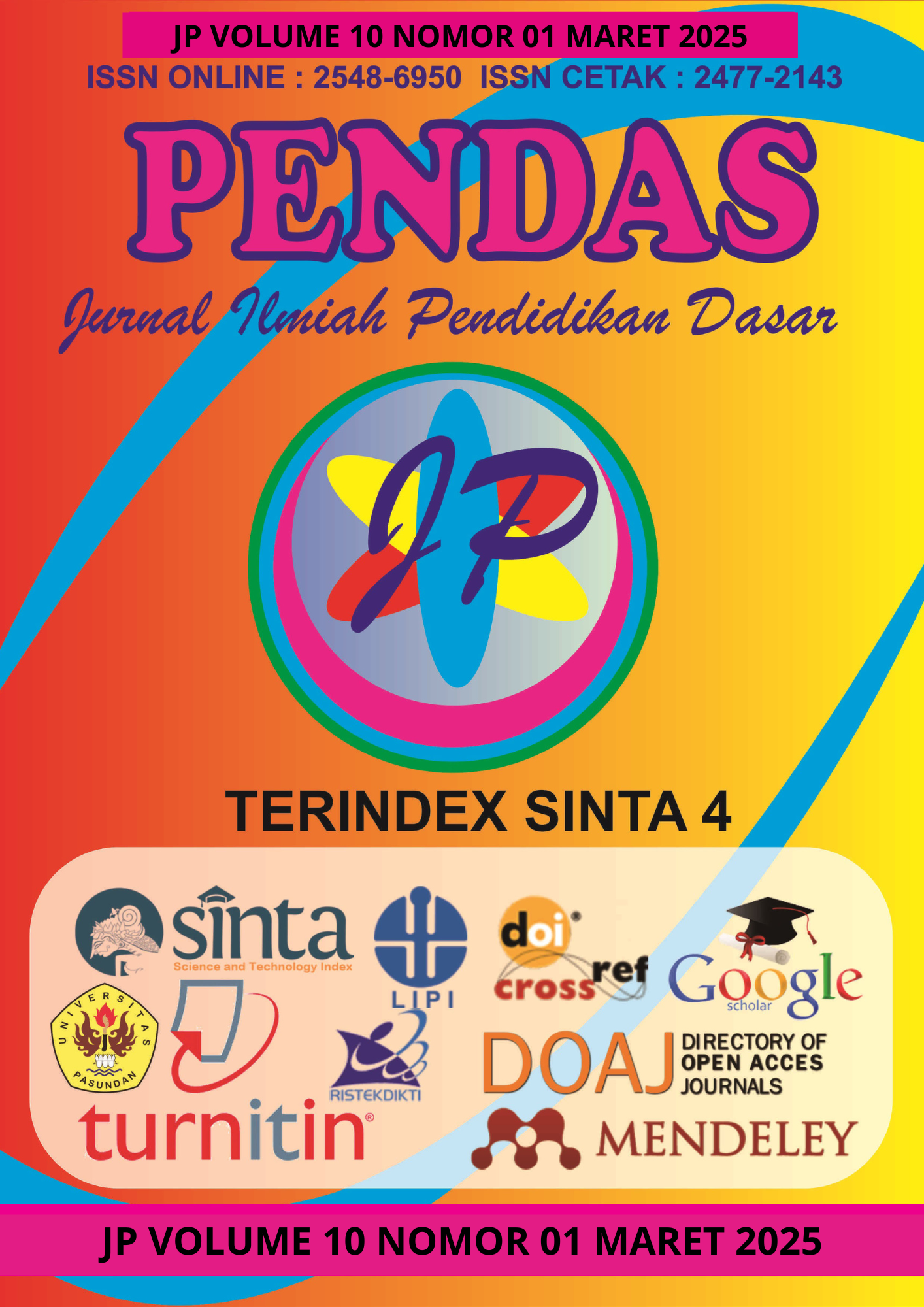PENERAPAN MODEL PEMBELAJARAN PBL PADA MATA PELAJARAN IPS UNTUK MENUMBUHKAN KEMAMPUAN BERFIKIR KRITIS SISWA KELAS IV SD NEGERI 1 MANIKYANG
DOI:
https://doi.org/10.23969/jp.v10i01.21008Keywords:
critical thinking skills, social studies learning, problem based learningAbstract
The phenomenon observed in the field shows that many students in grade IV of SD Negeri 1 Manikyang have not demonstrated optimal critical thinking skills in Social Studies (IPS) learning. Students tend to be passive during the learning process and struggle to analyze and evaluate the available information. This study aims to explore the application of the Problem-Based Learning (PBL) model in IPS lessons and to enhance the critical thinking abilities of grade IV students at SD Negeri 1 Manikyang. The research uses a qualitative approach with a descriptive-analytic method. The subjects of the study are grade IV students of SD Negeri 1 Manikyang and the teacher who teaches IPS. Data collection techniques include literature review and direct observation of the implementation of the PBL model in teaching. Data analysis techniques are conducted through categorization, thematic analysis, and data verification to ensure the validity of the findings.
The results of the study indicate that: 1) The application of the PBL model successfully increased student participation in IPS learning, with students becoming more engaged in group discussions and more confident in expressing their opinions. 2) Students' critical thinking abilities improved, as seen in their ability to analyze social issues presented to them, evaluate various possible solutions, and make appropriate decisions. 3) The PBL model also encouraged students to work collaboratively in groups, which developed their communication, cooperation, and problem-solving skills more effectively. Furthermore, students showed improvement in their ability to connect learned concepts to real-life situations.
Downloads
References
Arends, R. I. (2012). Learning to teach (9th ed.). New York: McGraw-Hill.
Arikunto, S. (2016). Prosedur penelitian: Suatu pendekatan praktik (Revisi ke-13). Jakarta: Rineka Cipta.
Creswell, J. W. (2014). Research design: Qualitative, quantitative, and mixed methods approaches. SAGE Publications.
Fakhriyah, N. (2014). Pengembangan kemampuan berpikir kritis siswa dalam pembelajaran IPS. Jurnal Pendidikan Ilmu Sosial, 10(2), 145-153.
Giarti, M. (2014). Model pembelajaran berbasis masalah (Problem Based Learning) pada mata pelajaran Ilmu Pengetahuan Sosial di sekolah dasar. Jurnal Pendidikan Dasar, 6(1), 85-92.
Koeswanti, T. (2015). Penerapan Problem Based Learning dalam pembelajaran IPS untuk meningkatkan keterampilan berpikir kritis siswa. Jurnal Pendidikan Dasar, 12(1), 73-80.
Kristin, A. (2016). Pengaruh model pembelajaran berbasis masalah terhadap peningkatan keterampilan berpikir kritis siswa di kelas IV SD. Jurnal Pendidikan Dasar, 13(3), 245-252.
Larasati, E. (2017). Peran pembelajaran IPS dalam mengembangkan keterampilan sosial siswa di sekolah dasar. Jurnal Pendidikan Ilmu Sosial, 11(4), 221-229.
Mardiana, R., & Hermawan, I. (2023). Penerapan model PBL dalam pembelajaran IPS untuk meningkatkan kemampuan berpikir kritis siswa di sekolah dasar. Jurnal Penelitian Pendidikan, 7(1), 105-112.
Nurmiati, S. (2020). Pengaruh model pembelajaran berbasis masalah terhadap keterampilan berpikir kritis siswa dalam pembelajaran IPS di sekolah dasar. Jurnal Pendidikan Ilmu Sosial, 15(2), 159-166.
Qomariyah, S. (2016). Efektivitas model Problem Based Learning terhadap kemampuan berpikir kritis siswa dalam pembelajaran IPS. Jurnal Pendidikan Dasar, 9(1), 55-63.
Rahayu, W. & Hermawan, H. (2019). Pengaruh penerapan model PBL terhadap kemampuan analisis dan evaluasi siswa dalam pembelajaran IPS. Jurnal Pendidikan Sosial, 8(1), 33-41.
Sugiyono. (2017). Metode penelitian kuantitatif, kualitatif, dan R&D. Alfabeta.
Susanto, H. (2016). Pendidikan IPS di sekolah dasar: Konsep dan implementasi pembelajaran. Jurnal Pendidikan, 14(2), 150-158.
Downloads
Published
Issue
Section
License
Copyright (c) 2025 Pendas : Jurnal Ilmiah Pendidikan Dasar

This work is licensed under a Creative Commons Attribution 4.0 International License.














































